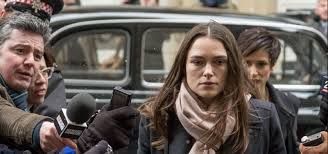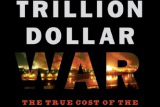Film review - Official Secrets

At a time when thousands of Iraqi anti-government protesters have clashed with security forces in Baghdad demanding jobs and better services, with more than 300 people killed since 1 October, it is appropriate to hear the story of someone who tried to stop the Iraq War of 2003 which devastated the country. 'Official Secrets' is based on the true story of a young whistleblower at the GCHQ surveillance unit in Cheltenham who leaked a secret memo to the press suggesting that the legal case for the 2003 Iraq War was based on lies.
On 31 January that year Katharine Gun (Keira Knightley) was copied into a classified memo sent to GCHQ by a senior figure in the NSA, its US equivalent. The memo was a top-secret request to monitor the private communication of UN delegates for scraps of information, personal or otherwise, that could be used to "give the US an edge" in levering support for an invasion of Iraq. Katharine leaked that memo in the belief that the revelation of the proposed bugging and blackmail tactics might be enough to stop a war justified by falsehoods. The email was printed out and passed on to an anti-war friend, and it eventually formed the basis of a sensational front-page scoop in The Observer newspaper.
Choosing between allowing the Official Secrets Act to silence her or respond to the growing impulse to tell the truth, Katharine decides to reveal that British Prime Minister Tony Blair is "manufacturing facts" and, in her own words, "I decided the public should know the lengths the Americans were going to in order to secure legitimacy for this war and I could tell this email was pretty explosive". After admitting to her superiors that it was her who leaked the memo, she was detained by the police and later charged with a breach of the Official Secrets Act. Her government called her a traitor, and the film shows how difficult it is to defend yourself legally against a treason charge. She is informed that she cannot reveal details about her work to her defending counsel, and then finds that her Turkish and Muslim asylum-seeker husband, Yasar (Adam Bakri), has been mysteriously shuffled up the list for imminent deportation.
Matt Smith plays Observer journalist Martin Bright - who wrote the original story - and other journalists are played by a host of famous names - Rhys Ifans and Matthew Goode among them. Conleth Hill plays The Observer editor Roger Alton who, despite the paper's pro-government line, cannot ignore a good story. We see a young journalist, whose innocent mistake in transcribing the email, replacing its American spellings with British ones, caused the story to be initially slated by media in the US.
Before that, on 15 February, 2003, a million people took to the streets of London to protest the prospect of Britain joining the war in Iraq. Katharine was amongst them. I like to think I may have walked beside her. "Public opinion was just so obviously against the invasion that I thought it wouldn't happen," Katharine recalls. When The Observer revealed her leaked email a week later she was shaken that the public now knew about it, and it was because of her. "I immediately felt like I was in danger," she said last month, as the film opened, describing her internal panic, though outwardly appearing calm. At home, she says, "I couldn't control myself - I was a total state, crying and trembling".
However, the war went ahead on 19 March 2003. Alastair Campbell's 'dodgy' dossier, claiming Iraq could attack the UK with biological weapons in 45 minutes, and Colin Powell's speech to the UN on 5 February, part of which features in the film, claiming that Saddam Hussein had links to Al Qaeda, pushed the case for war. But the film suggests there was a widespread understanding within the rank-and-file of the intelligence community, that the American and British governments were manipulating and potentially fabricating intelligence. When the US realised it would still fail to win a second UN vote, it launched the war on Iraq with Britain anyway.
Ralph Fiennes plays human rights lawyer Ben Emmerson, who defended Katharine, and we see Liberty discussing how to handle the case. The defence was that she felt she acted out of necessity, although she knew she was breaching the Official Secrets Act. There was also the question of the plea: would she admit to being guilty or argue her innocence? The advice was that by accepting what she'd done was illegal the jail term might end up reduced. "The problem was that I just didn't feel guilty," she said. "I'd have a criminal record for doing what was right." And so it was decided that once on the stand she'd state her innocence and hope for the best.
On 25 February 2004, Katharine arrived at the Old Bailey for her trial. Within half an hour, the prosecution had decided to drop its case, for reasons that to this day remain mysterious. It has been suggested that the government was desperate to ensure that documents containing advice about the legality of the war - which the defence had requested - would not be made public. During the course of the film it is explained how that Attorney General, Lord Goldsmith, had advised Tony Blair that war with Iraq would be unlawful and would amount to a war of aggression - advice that he later changed after a trip to the US where he met with Donald Rumsfeld and others in the Bush administration.
So, Katharine Gun did not stop the Iraq War, but she said last month that, "there are things you have to do not for the result but for the principle, because they are right". Keira Knightley herself says the "Iraq was the first time I'd been politically engaged". She was filming 'Pirates of the Caribbean' at the time of the street protests against war in February 2003 but her friends were there and sending her messages. She wished she had been able to join them.
I don't believe I knew the story of Katharine Gun before seeing this film, but it was interesting to view it alongside Pax Christi campaigners who had supported Katharine outside court in 2004. They are amazingly well-informed and faithful to the cause of peacemaking and supporting people who are brave enough to speak up against conflict. Katharine's action was not tied into religious beliefs, and she acknowledges that she was not particularly religious when asked about it. At the time the whistleblower story was drowned out by the US and UK war machines.
One issue the film raises for me is how difficult it is to challenge the establishment, even in a democracy. We see the bullying nature of Katharine's treatment and the intimidating mobilisation of lawyers by the government. 'Official Secrets' reminds us just how seriously the state took its pursuit of Katharine and how strong she had to be to say that she never regretted her action. We should bear her concerns in mind when we hear that, according to US airpower statistics, from November 2018 to September 2019 the US dropped 6,811 bombs on Afghanistan and 7,889 on Iraq and Syria. The Western powers are meanwhile pursuing a highly confrontational strategic alliance with the Gulf states and Israel aimed at isolating Iran and trying to bring down its government. Instead of mocking the anti-war movement why don't we take peace campaigners more seriously when they present an alternative vision? This might save the lives of British soldiers, as well as civilians in the targeted countries. The UK lost 179 servicemen and women in the eight-year Iraq war. The death toll in civilians is less clear, except that we know the number of deaths runs into the hundreds of thousands, including civilians killed as a result of violence and, more broadly, those who died because of the collapse of infrastructure and services in Iraq resulting from the ongoing conflict.
A linked issue is the importance of truth. Some of the information that would have been revealed at her trial, in particular Lord Goldsmith's "conflicting arguments" as to the legality of the invasion, did not fully emerge until the publication of the report of the Chilcot inquiry in 2016. In its absence, Tony Blair won another election in 2005. The film offers a valuable insight to us today as we note how major decisions can be taken which later turn out to be based on lies. There are obvious contemporary resonances. Director Gavin Hood and his two co-writers (Gregory and Sara Bernstein) successfully recreate a world where governments often hide important facts from their people in order to push the agendas they believe in. Katharine herself feels that "accountability is key", that the whole period surrounding her leaked memo saw the undermining of the judicial and parliamentary processes and the media and we still live with the consequences of that. She says: "Truth always matters at the end of the day."
Following your conscience is another important theme. You seem to be expected to leave your conscience at the door when you work in such areas as government surveillance, defence or arms trading. In one scene Katharine tells a British police officer accusing her of being a spy, "I do not collect information so that the government can lie to the British people". And she showed compassion for the millions of Iraqi civilians whose welfare was hardly being considered.
The head of prosecutions at the Crown Prosecution Service made it abundantly clear that, on instruction of the Attorney General, the reason for her prosecution was to make an example out of her and frighten off other whistleblowers. It's taken a long time for Katharine to talk about everything that happened. That level of pressure, stress and attention took its toll. "Even thinking about it all would cause me anxiety," she said in October, but she also says she would do it all again. Today, she lives in Turkey, with her husband and their child. "The world is moving in a completely fascist, corporate direction," she suggests; "it worries me, it should worry us all". But she suggests that there is a movement of people who are trying to stop it and whistleblowing on wrongdoing is part of that fightback. In her view, "it isn't a crime, it's a responsibility". This is an important perspective when we reflect that today's whistleblowers, such as Julian Assange, face lengthy incarceration and on-going torment.
'Official Secrets' is an engaging and relevant film for our times. It is well acted and carries a certain integrity, shining a light on an inspirational woman who challenges complacency. I suggest seeing it before the NATO Summit in Britain in December which will address, in its words, "current and emerging security challenges". It is interesting that in the electioneering so far the key security threat that the British population is worried about seems to be the climate crisis. And let the film remind us to stay engaged with the upheavals in today's Iraq. This story deserved to be told and has been told well.
Watch the Official Secrets trailer: www.youtube.com/watch?v=pP4zhzIyTUA
















